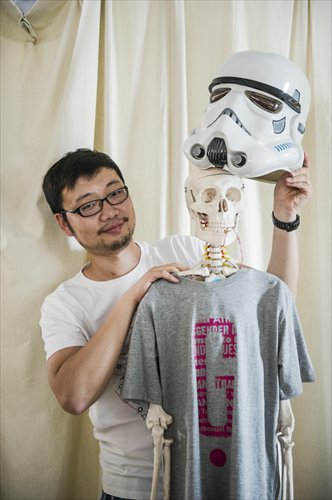Science for the masses
Scientists take to TV and Weibo to spark public bonanza

Wei Kunlin, associate professor in the Department of Psychology at Peking University, appears as a judge on science-based TV talent show Super Brain. Photo: IC
Hastily pacing his way across campus in a navy blue T-shirt and matching shorts, 36-year-old Wei Kunlin could be mistaken for a postgraduate student running late for class after a stint in the gymnasium.
In actuality, he is an associate professor in the Department of Psychology at Peking University. He is also a minor celebrity, having appeared as a judge on the televised talent show Super Brain, which screened on Jiangsu Satellite TV from January to March of this year.
The show purports to find people who possess abilities that might be considered "out-of-the-ordinary." One contestant was able to tell how much water there was in a glass, simply by listening to the sound emitted when rubbing one's finger along the glass's rim; another contestant solved two Rubik's Cubes, while blindfolded and submerged underwater, before he had to come up for air.
Wei's role on the show was to judge, as well as to explain to the audience, how difficult the tasks attempted by the contestants actually were, based on scientific theory. He has attracted a small army of fans, with more than 370,000 followers on Sina Weibo (China's equivalent to Twitter).
"In China, the level of scientific literacy among the general populace is very low," said Wei, explaining why he chose to do the show.
"That's why news stories about genetically modified foods and other topics that involve specialist scientific knowledge create such a fuss among the public. It's also the reason why so many people fall prey to scams and false claims made by pseudoscience in this country," said Wei.
Celebrity scientists
The problem, it seems, is not that there is a dearth of scientists in China, but that there is a dearth of scientists that are willing or able to educate the general public about scientific issues that concern them.
According to a report published in 2010 by the United Nations Educational, Scientific and Cultural Organization, China had more people who hold doctorates in Science and Engineering in the decade from 2001-2010 than any other country in the world, bar the United States, reported the Beijing Evening News.
But there remains a disconnect between the flourishing of science in China as a field of specialist study, and of science as a form of general knowledge among the masses.
Wang Dong, a former science tutor at a university in Shandong, speculates that this may be due to the differing funding incentives of the two countries.
"Unlike scientists in the US who often have to raise research money from private foundations and enterprises, most of the funding for scientific research in China comes from the government," said Wang.
Wei agreed with the fact that scientists in China did not do enough to promote a wider understanding of their work among the populace.
"The top scientists in China focus more on their own laboratory research. They're too busy to make their voices heard by the public," he said.
While there are a number of celebrity scientists with their own television shows (such as Adam Savage and Jamie Hyneman with Mythbusters, or William Sanford Nye with Bill Nye the Science Guy) in the West, far fewer programs of this kind exist in China. Such shows aim to popularize science among the masses, by making it fun, accessible, and understandable to a general audience.
In China, even those scientists who do have some name recognition - such as Qian Xuesen (1911-2009) and Yuan Longping - are mainly idolized for what they've managed to accomplish in their respective fields, rather than any contributions they might have made to promote a greater understanding of science among the general populace.
The problem is exacerbated by how science related news stories are handled in the Chinese media, with reporters sharing the general public's ignorance of scientific discourses.
"In China, the word 'expert' has been demonized. This is because the media delivers inaccurate or incomplete information," said Wei.
In particular, Wei expressed his consternation concerning a 2013 short online documentary presented by former CCTV host Cui Yongyuan. The documentary claimed that scientists in the US have not come to an agreement about genetically modified food, and furthermore, that the reason genetically modified foods had become widely accepted and consumed in the US was because of a lack of understanding about genetically modified food among the public there.
"Research has shown that genetically modified foods that are readily available in supermarkets are completely safe," Wei said. "There is nothing mysterious about the science behind genetic modification. The argument in Cui's film, which is based on nothing more than a conspiracy theory, undermines the assiduous efforts of Chinese scientists over the past decade."
Wei said that he joined Super Brain in an attempt to turn the tide.
"There is a public demand for science. The mass media needs to work with scientists to find more ways of increasing the level of scientific literacy among the general public."

Wang Dong, a senior editor at online science channel Guokr. Photo: Li Hao/GT
Grass-roots advocacy
Away from the glitz and glamour of the television studios, with its bright lights and throngs of adoring fans, efforts to popularize science are also being made by grass-roots scientific communities.
In 2008, a group of freelance science writers established the Songshuhui Association of Science Communicators (SASC). Their goal, according to the association's mission statement, is to be like "squirrels" who "strip bare the shells of science to the public."
In 2013, SASC co-founder Ji Xiaohua launched a website, guokr.com, to further their aims. Guokr's approach to educating the public about science is to tie scientific discourses to current affairs and social issues, as well as to pop culture. To ensure that articles are relevant and accessible to a general audience, Ji hired a Chinese Language major, Xu Lai, to act as editor in chief.
"We believe all news stories can be scientific news stories, regardless of whether they are about society, entertainment or sport," said Xu, who previously worked as an editor for a number of newspapers including Oriental Morning Post and the Beijing News. Contributors to the website include college science majors, science teachers and research fellows.
Guokr has a column especially devoted to quashing the spread of scientific misinformation. "Guokr provides the public with a number of informed scientific opinions from around the world on issues that concern them," said Xu.
"Our articles express the perspectives of the global scientific community, and is based on an abundance of academic research."
When, several days ago, the story broke that Malaysian Airline Flight MH17 was brought down by what is suspected to be a missile attack from near the Ukraine-Russian border, the team at Guokr worked through the night to provide coverage of the incident from a scientific angle.
Editors were tasked with monitoring the story as it unfolded, on social media pages, news feeds and overseas websites.
When it was reported that 108 AIDS researchers had died in the crash (a figure that has since been revised to just six), the editors decided to cover the incident from the point-of-view of the loss it represented to the AIDS research community, while elaborating on the current state of AIDS research around the world.
"Some scientists are not attuned to everyday life, or find it difficult to explain their work to a layman. Guokr helps them to find a topic that is of interest to a general audience, and also helps to ensure that their writing is not too academic, but can easily be digested by the public," said Xu.
A less solemn example of how Guokr does this can be found in their article dissecting the Chopstick Brother's hit pop song "Little Apple" from a scientific viewpoint.
"We ran a report examining the relationship between rhythm, movement and people's neurobiology, to explain why people are attracted to the song," Xu said.

Xu Lai, editor in chief of Guokr. Photo: Li Hao/GT
Looking to the future
The efforts being made by people like Wei and Ji are starting to bear fruit, with an increasing number of people in both the media and the general public taking a greater interest in trying to understand science.
Wei's television show has been renewed for a second season. According to the CSM Media Research Company, the first season finale of Super Brain had the highest audience share for its timeslot that evening.
Mirroring Super Brain's success, albeit somewhat more modestly, is Guokr. The online platform's AIDS-related report about the recent Malaysian Airlines plane crash had been reposted more than 130,000 times on Sina Weibo.
Other parts of the media have also started making space for dedicated science coverage.
Zhihu, an community-based Q&A website that might usefully be compared to Reddit, has a section devoted to questions about science. And last year, a new magazine called Wissen - Xinzhi in Chinese, which can be literally translated as "New Knowledge" - was launched, with coverage on scientific developments and discoveries making up 20 percent of its total content.
Although Wei is pleased with the success of his show and the steps that are being taken to improve scientific literacy in China, he's not counting his chickens before they hatch.
"Scientific literacy in China will improve gradually," said Wei.
"But it takes time. It isn't a project that can be completed within one or two generations."